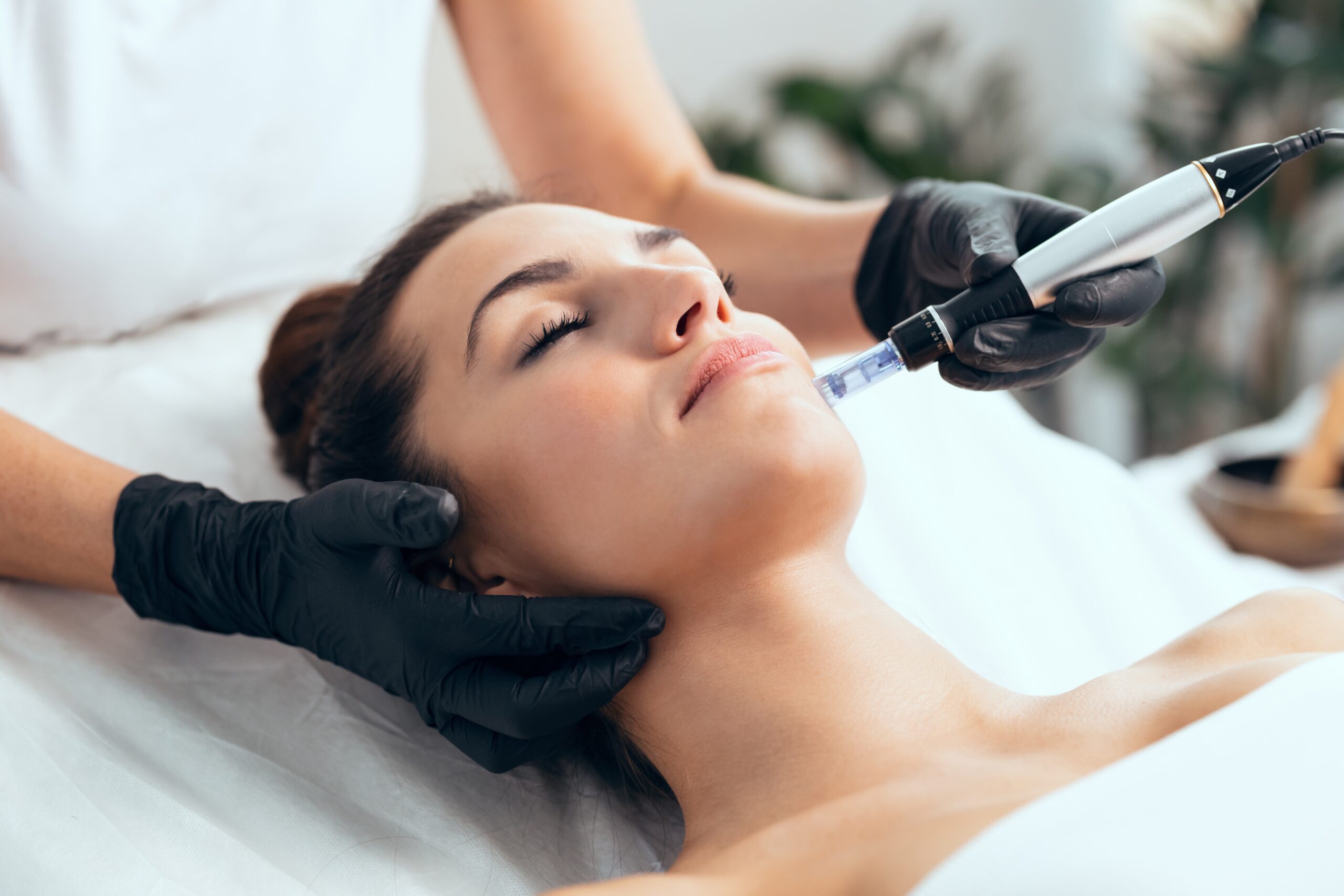Many people want to know when they can get microneedling after fillers, knowing that the timing between these procedures plays a crucial role in their success. This article will help you understand what happens to your skin while you wait and how to plan an effective schedule with the Beauty Vault team in West Hollywood.
What Happens in the Skin After Filler Injections
Your body’s response to filler injections helps explain why the timing between treatments matters. Several complex processes take place as your body adapts to and blends with the new filler material.
Filler Settling and Tissue Integration Timeline
The skin starts adjusting right after a filler injection. The treated area appears overfilled initially due to the filler and normal swelling. This fuller appearance isn’t your end result.
Your body processes the filler in several distinct phases:
- Immediate phase (0-48 hours): The gel-based filler creates volume and substantial swelling, makes the area puffy.
- Early settling phase (2-7 days): The swelling goes down and the filler spreads more evenly. You might notice small bumps or uneven areas that will smooth out naturally.
- Integration phase (1-2 weeks): The filler bonds with water molecules in your skin to create more volume.
- Final settling phase (2-4 weeks): Most fillers blend completely with surrounding tissues by this point. Ultrasound scans at 30 days show the filler has fully merged with your natural tissue, without any distinct areas remaining.
Different fillers take varying amounts of time to settle. For example, hyaluronic acid fillers need up to four weeks to blend and integrate fully. Collagen-stimulating fillers like Sculptra develop results more slowly over four to six weeks. In any case, the natural healing process needs time to finish before starting another procedure like microneedling.
Microneedling After Filler: What You Need to Know
Many patients who want aesthetic treatments consider combining different procedures to get the best results. Microneedling after fillers has become a popular combo that needs careful planning. These procedures each have unique benefits, but how they work together depends on timing and technique.
Can You Have Microneedling After Fillers Safely?
Yes, you can safely get microneedling after dermal fillers, but it comes down to the right timing between procedures. Medical experts agree that giving a chance for the filler to settle into your skin tissues is essential for ensuring your skin reacts properly to both treatments.
How Microneedling Interacts With Settled Filler
Your results can actually get better when microneedling is done after your filler has fully settled.
Specifically, microneedling creates tiny channels in the skin that boost collagen and elastin production. These channels help maintain skin structure, improve texture, tackles fine lines, and provide an overall boost to the filler’s effects. Fillers add volume and contours. Together, they offer two ways to rejuvenate your face. The collagen boost from microneedling might even help your filler results last longer.
Why Waiting is Critical for Optimal Results
The timing between these procedures affects your results directly. Getting microneedling too soon after fillers can cause several problems:
- Filler displacement: Early microneedling could move the filler around, leading to uneven results or migration.
- Excessive inflammation: Both treatments trigger inflammation. Your skin needs time to heal from fillers first.
- Extended recovery time: Rushing these treatments can increase swelling, bruising, and overall downtime.
A qualified Beauty Vault provider will assess your situation, looking at your skin type, the filler used, and your goals. This customized approach helps pick the best treatment order and reduces possible complications.
How Long Should You Wait Between Treatments?
The right timing between cosmetic treatments will give you optimal results.
Two-Week Rule for Standard Microneedling
Medical professionals agree that patients should wait at least two weeks between dermal fillers and standard microneedling treatments. Your fillers need this time to settle properly into the skin tissues, and the two-week mark usually allows dermal fillers to stabilize. Most side effects clear up by then, which means microneedling won’t disrupt your results or cause extra irritation.
Four-Week Rule for RF Microneedling
RF microneedling needs extra caution. In fact, patients should wait at least four weeks after fillers before getting RF microneedling. You need this extended waiting period because:
- RF microneedling goes deeper than standard microneedling.
- RF energy might affect your filler results.
- Treatment heat could interact with new filler.
The recovery period after RF microneedling typically runs four to six weeks before any additional treatments. This longer healing time ensures complete recovery and maximizes your results from each procedure.
Factors That May Extend or Shorten the Wait
Your skin type plays a vital role in determining the right waiting time. People who have sensitive skin or inflammatory conditions often need more time between procedures.
Treatment location affects timing, too. Sometimes, if your filler and microneedling target different areas, your Beauty Vault provider might schedule them closer together. For example, if you get lip filler but also want microneedling on your forehead, these treatments could happen sooner than usual.
Different fillers settle and integrate into your skin at varying rates. This affects how long you should wait between treatments.
Your personal healing response might be the biggest factor. Your Beauty Vault provider will look at how fast you bounce back from cosmetic procedures and adjust your timeline.
Signs Your Skin Is Ready for Microneedling
Your skin needs specific signs to show it’s ready for microneedling after fillers. Your body might need extra healing time beyond the recommended waiting period, based on how you respond to treatment.
Resolved Swelling and Bruising
You must wait for all visible healing signs to complete before starting microneedling. Swelling peaks within 24 to 48 hours after filler injections and goes down over several days. Bruises take slightly longer and usually clear up within a week.
Your swelling has properly resolved when you notice:
- The treated area maintains consistent size and shape all day
- Puffiness disappears, especially in the morning
- Your appearance returns to how it looked before treatment
Different facial areas swell differently. For instance, lips and under-eye areas show more noticeable swelling than cheeks or temples. Lip treatments look bigger at first but settle into your desired look over time.
Your tissue hasn’t fully recovered if you see uneven or lasting swelling after two weeks. You should wait longer before getting microneedling in this case.
No Tenderness or Inflammation
Your skin’s feel tells you a lot about its readiness for more treatments. The natural inflammatory response to filler injection needs to completely resolve first.
Signs that inflammation still exists include:
- The treated area is still warm.
- Light pressure causes tenderness.
- Skincare products feel unusually irritating.
- Redness stays even after gentle pressure,
These indicators point to ongoing inflammation under the surface, even if you can’t see swelling anymore. Starting microneedling too early could move your filler around or increase inflammation.
Schedule Your Filler and Microneedling Treatments With the Beauty Vault
The timing between fillers and microneedling treatments is crucial for keeping you safe and maximizing your results. Be open about your cosmetic goals with the Beauty Vault team in West Hollywood so that they can create a treatment plan as unique to you as your body’s healing response. To make an appointment, call them today at (323) 800-6770 or fill out a contact form.
FAQs
Q1. How long should I wait to get microneedling after filler injections?
It’s generally recommended to wait at least two weeks after receiving filler injections before undergoing microneedling. This allows the filler to settle and integrate with your tissues properly. For radiofrequency (RF) microneedling, it’s advisable to wait at least four weeks due to its deeper penetration and heat-generating properties.
Q2. Can microneedling affect my dermal fillers?
When performed at the appropriate time, microneedling shouldn’t negatively impact your fillers. In fact, it can complement filler results by improving skin texture and stimulating collagen production. However, if done too soon after filler injections, there’s a small risk of filler displacement or uneven distribution.
Q3. Is it safe to combine microneedling and filler treatments?
Yes, it’s safe to combine these treatments when done with proper timing and under professional guidance. Many patients find that the combination of fillers for volume and microneedling for skin texture offers comprehensive facial rejuvenation. Always consult with a qualified provider to create a personalized treatment plan.
Q4. What signs indicate my skin is ready for microneedling after fillers?
Key indicators include resolved swelling and bruising, absence of tenderness or inflammation in the treated area, and stable filler placement confirmed by your Beauty Vault provider. If you experience persistent swelling, redness, or sensitivity beyond two weeks, it’s best to postpone microneedling.








